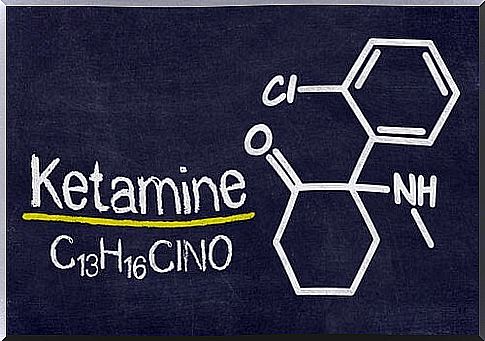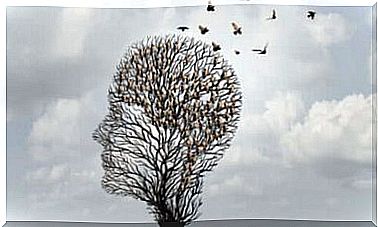Ketamine: An Illegal Drug As A Future Treatment For Depression

Ketamine is a drug known to be used at parties to enhance relaxation, and it is very common in these contexts. This compound was first synthesized in 1962 as an analgesic to relieve the wounded in war zones. Also, many veterinarians use it to anesthetize horses.
Since 2006, psychiatrists began to discover its potent antidepressant effect. However, the problem it presents is its characteristics and dangerous side effects. If we take a few minutes to explore the pharmacology of depression, we will see that prozac and its generic version, fluoxetine, have been replaced by other types of more specific antidepressants.
A good use and administration of them managed to potentiate their effect, reducing side symptoms and acting more specifically for the symptoms that must be treated.
An example of this is third-generation antidepressants such as venlafaxine, which work very well for depression that goes hand in hand with generalized anxiety. And so, thanks to the medication, the patient’s willingness to perform physical activities improves, so that the energy produced finds, in movement, a way to dissipate.
Still, 1 in 3 patients with severe depression still does not respond to prescribed treatments and relapses happen in 75% of cases (depending on the type of depression and patient). With this panorama, isn’t it worth considering other alternatives?
Depression in today’s world
Although they want to silence it, not even Silicon Valley celebrities, musicians or programmers can escape it. Andrés Iniesta himself spoke about depression in his autobiography, as did Bruce Springsteen. Depression will, in a few years, be the main cause of disability.

The problem is that today, despite advances, we still do not have multidisciplinary treatments or interventions that are effective for all cases. Hence the need to invest in research and to continue exploring new options.
Awareness of ecology, mental health and the distribution of knowledge and wealth will be present in the coming years. Furthermore, this is a good thing if we want to survive as a species and even migrate to other planets.
All these changes influence our mood; stress turns into sadness and there are more people who feel disconnected from the world in this whole process of change.
On the other hand, although the context can influence it, depression has been a subject since the time of Hippocrates, and throughout history it has acquired different meanings.
Severe depression and post-traumatic stress: people who cannot reconcile with the world
In addition to symptoms related to altered sleep, appetite, abulia, sadness and irritability, both in post-traumatic stress and in severe depression, there is a feeling of loss of control and connection with the reality that surrounds patients. All of this leads to a deep sense of hopelessness. Whether triggered or not, depression pulls the subject out of the world or vice versa.
Selective serotonin inhibitors such as prozac, along with cognitive-behavioral therapies, appear to be the best option to improve the patient’s condition. Concretely, the “behavioral activation” component is what works best.

Medication appears only to improve symptoms in very severe depression, atypical or with vegetative symptoms. Furthermore, pharmacological treatment does not seem to show advantages over the psychological isolated or in the medium-long term. So it doesn’t seem like a very attractive option, especially considering the numerous side effects.
The dissociative effect: the distinctive element of ketamine compared to fluoxetine
As mentioned above, the most common antidepressants act as selective serotonin reuptake inhibitors at the presynaptic level, thus increasing their presence in the brain. Something similar to “letting the pleasure last longer”, artificially activating the “happiness” mechanism, stimulating its main neurotransmitter.
However, not all severe depressions improve significantly with this pharmacological treatment. In many cases, this state prevents the initiation of psychological therapy. So how can ketamine help with all of this?
Ketamine cannot be administered without strict medical supervision. In this sense, many tests are being carried out with surprising results. The most revolutionary would be to isolate the molecule that achieves all the positive effects (potent and fast), thus eliminating the part of the compound that produces the most side effects.
If we compare it to other antidepressants, the speed and the great effect produced by it is what makes the difference in favor of ketamine. On the other hand, this synthesized compound offers hallucinogenic experiences and dissociative changes that happen in a second: the “I” suddenly unfolds and sees an alien reality, perhaps beyond the extreme cognitive dissonance in which your “usual self” lives with respect to the world .

When a person seems to reconcile with the world under the effects of ketamine, we don’t know if he is capable of experiencing a parallel reality. In this sense, it seems that the hallucinatory perceptual experience activates the person’s senses in such a way that it amplifies their sensations : so much so that unpleasant memories would have no place in this “new reality”.
Perhaps it is the reality and the stigmas we create in society that make people sick. Perhaps it’s the social products that weaken emotional defenses and cause this tunnel effect in our vision that only allows us to see closed doors.
One way or another, the truth is that depression increasingly presents itself as a greater challenge : its incidence is increasing and the effectiveness of treatments, therapies and intervention plans needs to evolve in order to provide an effective response to all cases . Is ketamine part of the solution?









